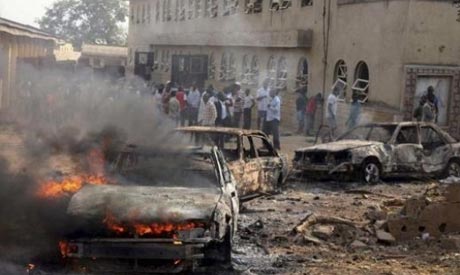
A car burns at a bomb explosion at St. Theresa Catholic outside Nigeria's capital Abuja, in which the Islamist militant group Boko Haram claimed responsibility December 25, 2011. (Photo: Reuters)
Nigeria's government and Islamist group Boko Haram have been in indirect talks to end deadly violence blamed on the extremists, two sources familiar with the discussions said Friday.
"There have been preliminary talks between a Boko Haram-appointed intermediary," a senior security official told AFP on condition of anonymity, adding that Boko Haram has set out terms for a temporary ceasefire.
A diplomatic source said there have been contacts between Nigeria's government and Boko Haram through intermediaries.
The security official said Boko Haram has proposed a three-month truce if all of its detained members are released and if the government halts any further arrests. He said the government was looking at the proposal.
Government officials either declined comment on the information or could not be reached.
Boko Haram has been blamed for scores of shootings and bomb blasts, mostly in northern Nigeria, which have killed more than 1,000 people since 2009.
It claimed responsibility for an August suicide attack at the UN headquarters in the capital Abuja which killed 25 people and for coordinated bombings and shootings in Nigeria's second city of Kano on January 20 which left 185 people dead -- its deadliest assault yet.
The group had initially claimed to be fighting for the creation of an Islamic state in northern Nigeria, but its aims and structure have since become less clear, while its attacks have grown increasingly deadly and sophisticated.
Calls have mounted for talks to take place, with Nigerian authorities seemingly unable to stop attacks blamed on Boko Haram that have shaken Africa's most populous nation and largest oil producer.
While there have been no attacks on the scale of the Kano carnage since January, sporadic violence has continued, including bombings of police stations and attacks on checkpoints.
The group is believed to have a number of factions, but the indirect talks were said to be with the main branch of the group led by Abubakar Shekau.
Last week's killing of a British and an Italian hostage in northwestern Nigeria was blamed on a splinter faction of Boko Haram, though many have expressed doubts over the group's alleged involvement.
Boko Haram had not been previously known to carry out kidnappings, and a purported spokesman for the group has denied responsibility.
There has been intense speculation over whether Boko Haram has ties to outside extremist groups, including Al-Qaeda's north African branch.
Diplomats say such links have been limited to training for certain Boko Haram members and that there has been no evidence of operational ties.
According to the security official, one of the intermediaries for the indirect talks was a northern cleric trusted by Boko Haram.
"The problem is not about the sect's readiness for dialogue, but winning their trust and confidence that the government is genuine in its intentions because they still have the fear of betrayal and back-stabbing on the part of the government," the official said.
"The leaders are afraid that they could be arrested once they come out for direct talks. The major hurdle is to win their confidence that nothing will befall them if they show their faces."
The diplomatic source could not provide details, but said there had been "real contacts" between the government and Boko Haram through intermediaries.
A previous attempt to engage Boko Haram in talks early last year failed when Boko Haram objected to the demand that they surrender their arms as a condition for a peace agreement that would have involved an amnesty, the security official said.
Those talks were mediated by a former state governor, he said.
Nigeria's 160 million population is roughly divided between a mainly Muslim north and predominately Christian south.
Short link: